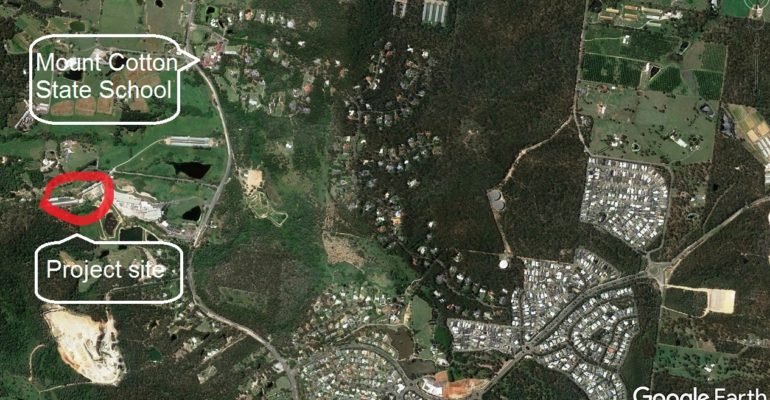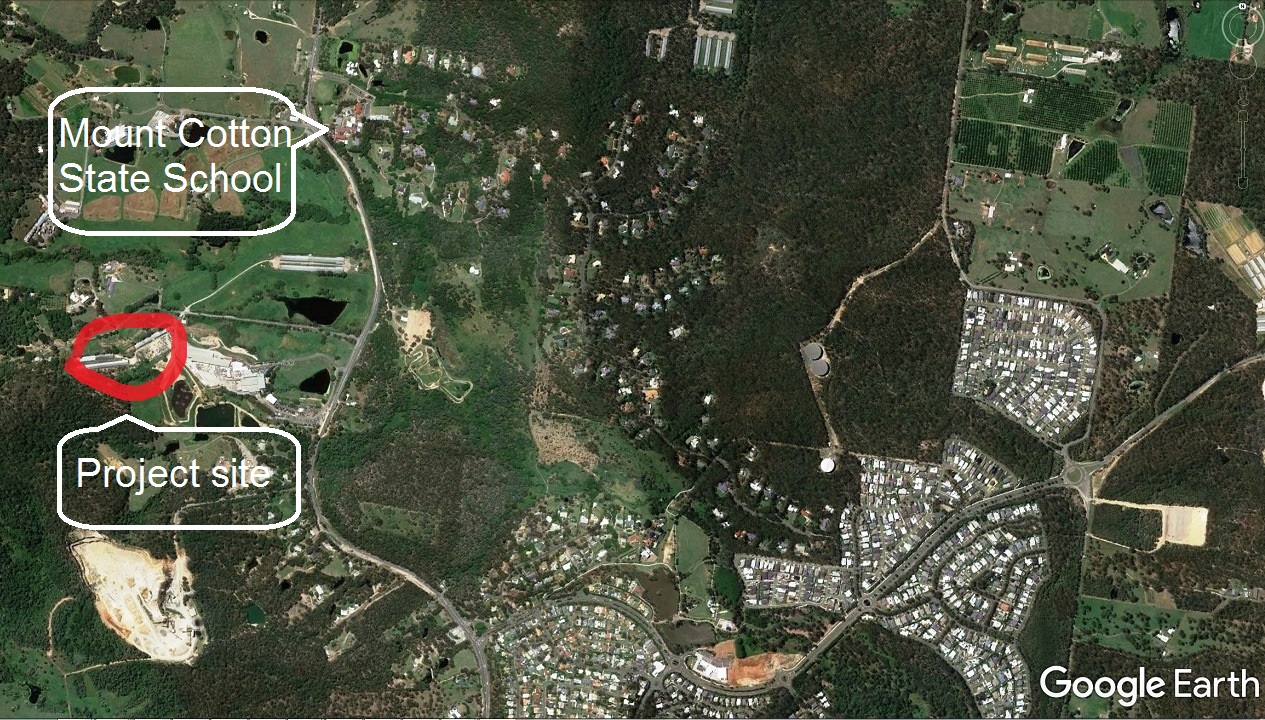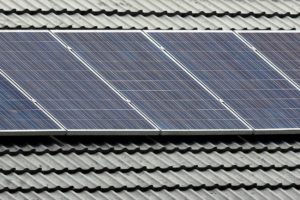

The chicken poo power station project site was close to residential housing and the Mount Cotton State School.
Plans to build a chicken poo power station next to the Golden Cockerel abattoir in Mt Cotton were abandoned this week when the developer agreed to cease appeals in the Planning and Environment Court.
Legal action had been initiated against Redland City Council by Cleveland Power, a subsidiary of Darwalla Milling Company. They wanted a third extension period for a project first proposed back in 2004.
Controversial project
This project has been controversial since it was first proposed with many community members and local residents opposed to its environmental impacts including emissions and truck movements.
Redland City Council’s stance on the project has changed over the years as elections have changed the balance of power within council.
The pro-developer Seccombe council supported the project, approving it in 2007. But the Hobson Council elected in 2008 refused the developer’s request for an extension period in 2011.
Mayor Karen Williams and local councillor Julie Talty appear to have been strong proponents of the project which ensured Council support during the first Williams council (2012-2016). During this time, the developer was given two extensions – by the Planning and Environment Court in March 2013 and by Redland City Council in May 2015.
After elections in 2016 a majority of councillors took a different tack, refusing a third extension.
The net cost to Redland City council of dealing with this development application, over a period of nearly 14 years, is understood to exceed $600,000 including the legal costs of dealing with appeals by the developer.
Council refuses third extension in 2017
In March 2017 Redland City councillors disregarded the recommendations of Council officers and voted to refuse another extension on various grounds including that:
- the nature of the community and its awareness of the project had changed significantly since the original application was lodged in June 2004
- the developer had not complied with the Court’s requirements to consult with the community
Concerns that the Council would be unlikely to succeed in defending its refusal in court, and end up having to pay the developer’s legal costs were expressed by a number of councillors – including some councillors who still voted to refuse the third extension period.
Councillors discussion about whether or not to grant a further extension, and the their views on likely outcomes of refusing the development, can be viewed on the meeting video recording commencing at 1:01 hours.
Council’s decision to refuse the extension was supported by councillors Wendy Boglary, Paul Golle, Lance Hewlett, Mark Edwards, Murray Elliott, Julie Talty and Paul Bishop.
Crs Peter Mitchell and Paul Gleeson voted against the motion to refuse the extension.
Mayor Karen Williams was absent from the meeting, attending a delegation to Canberra. Cr Tracey Huges declared a perceived interest and left the room.
Cleveland Power’s response
Next day, developer spokesperson David Bray criticised the Council’s refusal decision as “dumb”.
“Ratepayers can expect a legal bill in the hundreds of thousands of dollars…” he said.
Cleveland Power filed an appeal against Council’s refusal decision on 27 April 2017.
Additional legal action was taken by the developer in December 2017, seeking approval for changes to the proposed power station including:
- 80% increase in generation capacity from 5 MW to 9 MW
- Technology change from rotary kiln to boiler.
Recently, the developer proposed to cease all legal action on the basis that each party pays its own costs.
Councillors voted unanimously to accept this offer, at a general meeting on 21 February 2018.
A new development application would be required if Cleveland Power still wants to build a biomass power station in Mount Cotton. There are no indications, at this stage, that the project will continue.
Why burn chicken poo?
Cleveland Power’s proposed project was to build a small 5 megawatt (MW) power station next to the Golden Cockerel chicken processing plant at Mount Cotton. The capital cost of this project was estimated in 2013 to be $20 million.
The power station was expected to use as fuel 60,000 tones per year of chicken poo, a waste product from poultry production.
By burning a form of biomass, the project’s electricity output may have qualified for various renewable energy grants and subsidies.
Queensland has 12,916 MW of power generation capacity so a 5 MW project would have little impact on the State’s power generation requirements.
If the power station was able to operate reliably around the clock, it might supply enough electricity to power about 10% of all residential dwellings in Redland City.
Financial viability was always going to be a problem

Rooftop solar panels
The power generation market is competitive and small projects such as the Mount Cotton biomass project typically struggle to achieve financial close without generous government subsidies.
But governments usually won’t provide such assistance unless there is a clear public benefit such as pioneering the development of new technology.
While the developer was wondering how to achieve financial close, external challenges included:
- Uncertainty about Federal Government policy on energy and climate change since 2006
- The global financial crisis in 2007/2008
- Rapidly reducing cost of wind and solar power generation, especially roof top solar panels
Community opposition to chicken poo power
This project attracted strong community opposition when it was first proposed in 2004.
Three hundred and thirty-three (333) submissions were received on the original development application. All but one submission objected to the proposal. (Report to Council 6 May 2015).
A key area of concern was the risk of harmful atmospheric emissions from burning organic waste. This concerned nearby residents who rely on roof collection of rainwater. The power station stack would have been about 600 metres from the Mount Cotton State School.
Increased truck traffic transporting chicken poo to the site was another issue concerning residents.
Since the chicken poo power station was originally proposed many new dwellings have been built in the surrounding area, increasing the number of potential objectors.
Political donations by Darwalla
Prior to Karen Williams being elected Mayor in 2012, Darwalla donated $2,000 to the pro-Williams campaign mounted by the Concerned Redlands Residents Association (CRRA).
Before her re-election in 2016, Karen Williams received a $2,500 donation from “Darwalla Milling”.
No conflicts of interest were declared prior to Council’s decision on 21 February 2018 to accept the developer’s proposal for ending legal action about the chicken poo plant.
Timeline for the chicken poo power project
| 2004 June | Application lodged |
| 2004/2005 | Community consultation |
| 2006 | State Government agencies respond |
| 2007 March | Project approved by the pro-developer Seccombe Council |
| 2007 | Decision appealed by a local resident |
| 2007 November | Settlement by consent of Planning & Environment Court |
| 2008 | Melva Hobson elected Mayor |
| 2011 | Hobson council refuses extension, developer appeals |
| 2012 May | Karen Williams elected mayor with pro-developer majority |
| 2012 October | New council supports extension in closed session decision |
| 2013 March | Court grants extension |
| 2015 May | Council grants second extension at general meeting 6 May 2015 |
| 2016 March | Karen Williams re-elected mayor but lacks majority |
| 2017 March | Council refuses extension at general meeting on 22 March 2017 |
| 2018 February | Council votes to end legal action on terms proposed by developer |
Further reading from Redlands2030
Council refuses extension for chicken poo plant
Chicken poo plant extension on Council agenda
The chicken-poo power Magical Mystery Tour
Community concerns about chicken poo plant
Questions for Council over chicken poo project
Redland City Bulletin stories
Mount Cotton chicken litter-fired power plant approvals lapse
Residents fired up over power plant
Birkdale group ordered to pay $2000 court costs
Please explain: call for Biomass documents
Court cases involving Cleveland Power
4763/17 Cleveland Power Pty Ltd v. Redland City Council (8 December 2017 – 22 February 2018)
1476/17 Cleveland Power Pty Ltd v. Redland City Council (27 April 2017 to 22 February 2018)
5192/11 Cleveland Power Pty Ltd v. Redland City Council (22 December 2011 – 20 March 2013)
4856/12 Cleveland Power Pty Ltd v. Redland City Council (11 December 2012 – 9 July 2013)
1251/07 Bridge v. Redland Shire Council and another (2 May 2007 – 22 November 2007)
Redlands2030 – 25 February 2018
Please note: Offensive or off-topic comments will be deleted. If offended by any published comment please email thereporter@redlands2030.net
2 Comments
The ongoing saga of the incinerator, my great disappointment is that Cr Talty never at any time informd the Mt Cotton community of the proposal and their amendments, even though it was public information and on Council web site. Also Mayor Williams being a resident of Mt Cotton at no time informed the many hundreds of people who have been concerned about this development and what they were proposing and its implications. It is strange that Mayor Williams didnt acknowledge a conflict of inteterst consideirng she has received donations from Darwalla.
On a positive note this is a good outcome for the many families living on the western side of Mt Cotton Road who all rely on tank water and their concerns regarding toxins affecting their drinking water.
Good news for the many families who attend Mt Cotton school as this development is only 600 metres from the school
Good news for the residents who have been concerned about more trucks as this latest proposal would have added many more trucks coming from all over SEQ to deliver the chicken manure.
Good news for the neighbours who live only 100 metres from the proposed incinerator and were never advised of this new plan for a substantial change to the incinerator.
Good news for the ratepayers as this application over the many years has costs the Council about $600,000 to assess and defend in the courts.
Good news for the company that collects chicken manure and used for composting, benefiting the agricultural industry.
To those professional people who would read the applications and advise myself and others of the implications, Thank you.
Now we all just have to hope that this ugly development does not rear its head again in Mt Cotton. it is a heavy Industry and not suited for Mt Cotton
I am not taking here either a ‘for’ or ‘against’ stance on the matter of the Bio-mass power generating plant, but I just want to point out the consistent but inappropriate use of the term ‘chicken poo’ as the fuel to be used for the proposed plant.
I think that there is a big difference between what the average uninitiated person would understand by the term ‘chicken poo’ and the more appropriate term ‘chicken litter’.
‘Chicken poo’ implies raw chicken droppings, which is quite an offensive-sounding material. ‘Chicken litter’, on the other hand, is a combination of bedding material (typically wood shavings or similar), moisture and a variable proportion of chicken droppings (ie. manure or ‘poo’), depending on management of the growing shed conditions.
Chicken litter is typically 75% dry matter, of which 36% is Carbon, with varying percentages of Nitrogen, Calcium and Phosphorus, plus smaller amounts of Potassium, Sulphur, Magnesium and Sodium. [Source: Department of Agriculture and Fisheries – https://www.daf.qld.gov.au/business-priorities/animal-industries/dairy/feed-and-nutrition/chicken-litter.%5D
I think we should be using the more appropriate, and possibly less emotive term.